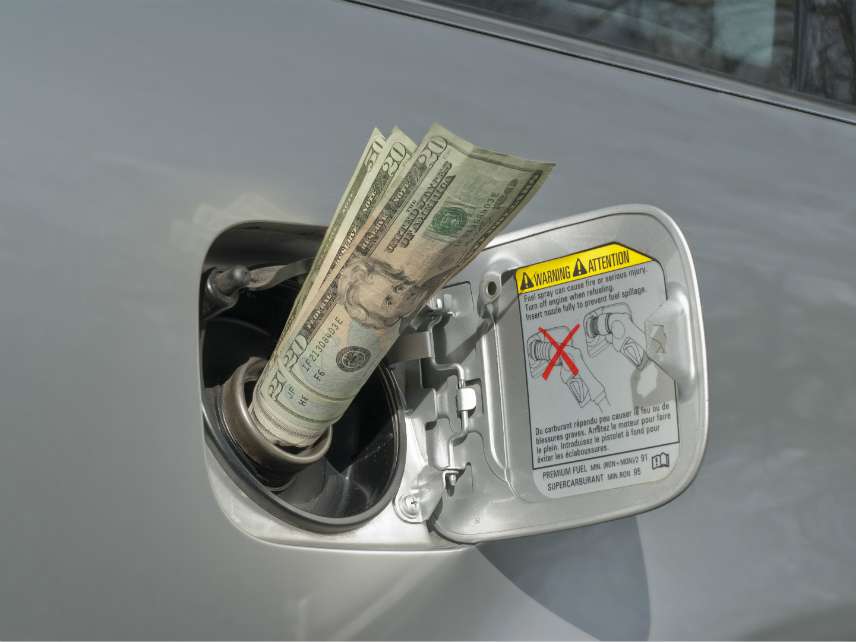Who Wants a Big Gas Tax Hike?
Some people are pushing Trump to fund his infrastructure dreams with a 140 percent increase in the federal gas tax.

As the Trump administration prepares its plan on how to deliver the $1 trillion infrastructure investment that it keeps promising, some voices are calling for a steep hike in the federal gas tax.
On Thursday the Chamber of Commerce unveiled its set of infrastructure policy priorities. It included a whopping 140 percent increase in the federal gas tax, from 18.4 cents per gallon to 43.4 cents per gallon. The Chamber estimates that this will bring in an additional $394 billion in revenue over the next decade.
"It's the simplest, fairest, and most effective way to raise the money we need for roads, bridges, and transit," the group's president, Tom Donahue, said in a speech yesterday. "Our leaders need to stop hiding behind the fallacy that this can't be done and just go do it."
Long been a priority of American businesses interests, a higher gas tax has also attracted a good deal of center-left support. The New York Times editorial board has endorsed an increase. So have the ranking Democratic members of the House and Senate Committees dealing with infrastructure spending. Donald Trump himself has expressed his openness to the idea.
The federal gas tax was last raised in 1993. Proponents claim that failing to increase it has left the roads crumbling and the Highway Trust Fund underfunded.
They're wrong, says Baruch Feigenbaum, a transportation policy expert at the Reason Foundation (the nonprofit that publishes this website). The quality of road infrastructure "often has to do more with management and priorities rather than it does with funding," Feigenbaum says.
On the state level, he notes, there is little correlation between high gas taxes and high-quality, well-maintained roads.
That is most obvious in the state of California, which has both high gas taxes and terrible roads. Bureau of Transportation Statistics data from 2013 found that only about 15 percent of the state's highways were in good condition, as measured by the International Roughness Index; a full 40 percent were in poor condition. Meanwhile, California was levying 48.7 cents in taxes on every gallon of gas sold in the state.
Georgia, by comparison, was adding only 28.5 cents in taxes to every gallon of gas in 2013, and yet it was able to keep 54 percent of its roads in good condition. Only 12 percent were in poor condition.
Georgia "has very good roads of high quality because that is where they spend their resources," Feigenbaum says. "California has crappy roads because they spend their money somewhere else." California's latest gas tax hike saw hundreds of millions of dollars siphoned off to pay for high-speed rail, local transit, and recreational trails.
The federal Highway Trust Fund—where the gas tax is deposited—has a similar problem of spending on local transit and other non-road-related projects, undercutting the argument that it is simply a user fee paid by drivers.
Some 15 percent of the federal gas tax is deposited straight into the Highway Trust Fund's Mass Transit Account, which disburses money for local bus, light rail, and other mass transit services. Another $850 million or so of the trust fund is diverted to the Transportation Alternatives Fund, which goes to beautifying streets and building recreational trails.
"Do you really want to increase taxes when you have this waste going on?" Feigenbaum asks.
On top of this, continual improvements in fuel efficiency and the potential growth in electric vehicles are making the gas tax an increasingly obsolete way to fund and finance new infrastructure improvements.
"I like to describe it as a rock star on their farewell tour," he says. "It's getting old, it's not going to be around forever, and we have to come up with a solution." Feigenbaum suggests that Congress make greater use mileage-based user fees, and that it rely more on the private sector for infrastructure improvements.
Trump's infrastructure plan will reportedly rely on $200 billion in direct government funding to attract another $800 billion in private capital. That $200 billion will have to come from somewhere. Congress can listen to people like Feigenbaum, or it can compel Americans to shell out a lot more when they fill up their tanks.
